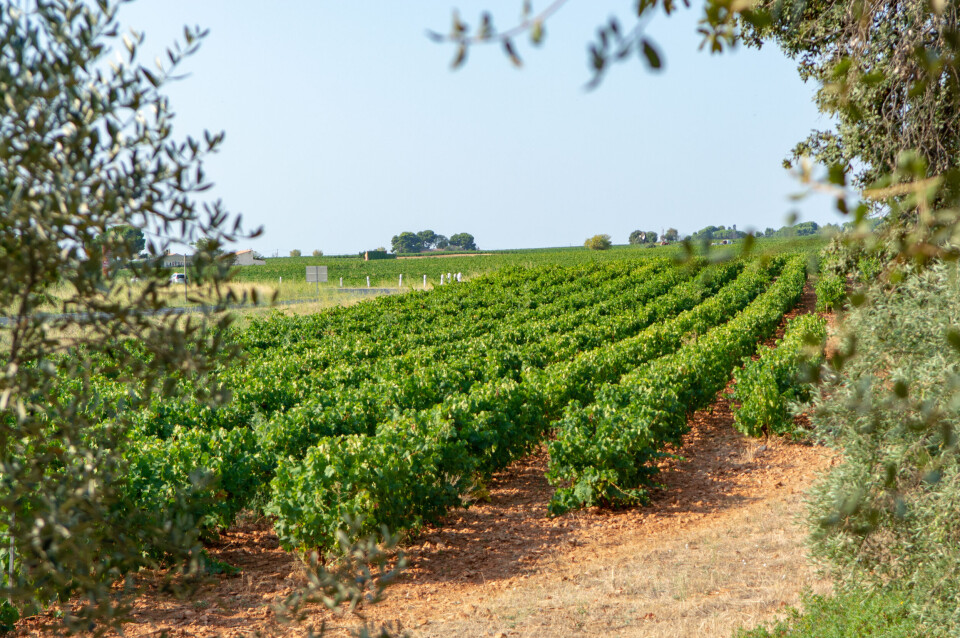-
Rugby vocabulary to know if watching the Six Nations in France
From un tampon to une cathédrale, understand the meaning of key French rugby terms
-
Duck Cold! Four French phrases to use when it is freezing outside
We remind you of French expressions to use to describe the drop in temperature
-
When and why do we say le moral dans les chaussettes?
We explore this useful expression that describes low spirits
The temperature is rising in France’s hottest village
Vérargues’ claim to fame may attract heat-seeking tourists, but it is taking a desperate toll on the local viticulture.

Are you feeling the heat this summer? Wherever you are in France, it is unlikely to be as hot as in Vérargues in the southern department of Hérault, site of the highest temperature ever recorded in France.
In the summer of 2019, most of Europe was suffering a heatwave – or canicule – and for the first time in history, temperatures in France soared as high as 45°C (113°F). Before this particular heatwave, the country’s highest-ever temperature of 44.1°C had been recorded in August 2003 in the village of Conqueyrac in the Gard, but this was beaten several times in 2019.
On the day itself, June 28, 2019, Gallargues-le-Montueux (also in the Gard) became France’s new record holder, as it registered an unprecedented 45.9°C through its automated weather stations that send data directly to Météo France. However, its moment of ‘glory’ was cut short when Météo France later confirmed that another village – Vérargues – had officially topped the charts with 46°C (114.8°F).
Read more: Map: What is the highest temperature recorded in your part of France?
Heatwaves and consequences
Ten kilometres west of Gallargues-le-Montueux, Vérargues is home to one of France’s climatology stations, which are all run by volunteers. Data from these stations is official, but Météo France takes time to intervene and validate their results. This delay explains why two villages were vying for the top spot.
The heatwaves of June and July 2019 were extreme, leading to thousands of fatalities across Europe, and 1,435 deaths in France alone. According to weather experts, the exceptional conditions were caused by high pressure and winds coming from the Sahara Desert that swept across Europe, resulting in record-breaking highs for many countries. By comparison, Greece hit 48°C, Portugal 47.4°C, Spain 47.3°C, Italy 47°C, and Bosnia-Herzegovina 46.2°C in that same month, giving France the sixth hottest temperature recorded in a European country.
Read more: France heatwave tips: How to sleep, keep cool and stay healthy
Vérargues is a relatively quiet village of 700 residents, framed by vineyards and olive trees, famous as the birthplace of Muscat de Lunel wine. Unsurprisingly, the extreme temperatures of 2019 were devastating for viticulture, and it is estimated that 10,000 hectares (38 square miles) of vineyards were ruined within the Gard department alone.
This central area of southern France sits between Avignon and Montpellier, 20 minutes from Nîmes, and usually appreciates the Mediterranean warmth, building its economy around the climate. Following the heatwave four years ago, however, and with continuing high temperatures, some locals are concerned.
Impact of heatwaves on vines
President of the Cooperative Muscat de Lunel, Frédéric Saint-Jean is from a family of winemakers and now cultivates nearly 20 acres of vines near Vérargues. He explained that due to the 2019 heatwave, he lost over two-thirds of his grape harvest, a loss from which he has been recovering ever since. "Every year we’re aware of the problem of climate change, so we’re going to have to do what we can," he observed. "We’ll have to adapt, that’s for sure."
Of course, if you are a fan of warm weather, this village could be calling out to you. When you come to Vérargues, you can expect a quiet rural spot with square mas buildings, terracotta rooftops, and acres of vines.
If you would like to visit a working vineyard, head to nearby Saint-Christol, where you can explore the Domaine Guinand, a 65-hectare vineyard that has been run by the same family for eight generations. Book in for a tasting tour, browse art exhibitions, enjoy a meal, and try the sparkling wine or olive oil.
Alternatively, a 20-minute walk from the centre brings you to Château de la Devèze, an estate dating from 1701 and a listed Historic Monument, so you can admire the architecture then seek refreshment with a glass of Muscat de Lunel. On a hot day, there can be fewer places more pleasant than a cool wine cellar, and Vérargues can certainly offer that.
Related links
9 French expressions to use when there is hot weather
New study estimates the deadly impact of France’s summer heat
How to keep your house cool in the high heat of the French summer
























